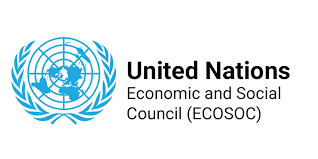
Economic and Social Council
The Economic and Social Council is the principal body for coordination, policy review, policy dialogue and recommendations on economic, social and environmental issues, as well as implementation of internationally agreed development goals. It serves as the central mechanism for activities of the UN system and its specialized agencies in the economic, social and environmental fields, supervising subsidiary and expert bodies. It has 54 Members, elected by the General Assembly for overlapping three-year terms. It is the United Nations’ central platform for reflection, debate, and innovative thinking on sustainable development.
المجلس الاقتصادي والاجتماعي هو الهيئة الرئيسية للتنسيق ومراجعة السياسات وحوار السياسات وتقديم التوصيات بشأن القضايا الاقتصادية والاجتماعية والبيئية، فضلا عن تنفيذ الأهداف الإنمائية المتفق عليها دوليا. وهي بمثابة الآلية المركزية لأنشطة منظومة الأمم المتحدة ووكالاتها المتخصصة في المجالات الاقتصادية والاجتماعية والبيئية، وتشرف على الهيئات الفرعية وهيئات الخبراء. وتضم 54 عضوًا، تنتخبهم الجمعية العامة لفترات متداخلة مدتها ثلاث سنوات. إنها منصة الأمم المتحدة المركزية للتأمل والنقاش والتفكير الابتكاري بشأن التنمية المستدامة
- Teacher: BAKEL ASMA
The main bodies of the United Nations are
The United Nations System consists of “the United Nations' six principal bodies” to achieve international cooperation in solving economic, social, cultural, and humanitarian problems including promoting respect for human rights and freedoms.
· The General Assembly
· The Security Council
· The Economic and Social Council
· The Trusteeship Council
· The International Court of Justice
· And the UN Secretariat
تتكون منظومة الأمم المتحدة من ست هيئات رئيسية لتحقيق التعاون الدولي في حل المشكلات الاقتصادية والاجتماعية والثقافية والإنسانية بما في ذلك تعزيز احترام حقوق الإنسان والحريات
· الجمعية العمومية
· مجلس الأمن
· المجلس الاقتصادي والاجتماعي
· مجلس الوصاية
· محكمة العدل الدولية
· والأمانة العامة للأمم المتحدة
International Court of justice
The United Nations has six main organs. The International Court of Justice is among these organs. The seat of the Court is at the Peace Palace in The Hague (Netherlands).
It's the principal judiciary of the United Nations, also it's known as the world court ICJ. It was established in 1945 and began working in 1946. The court's role is to settle in accordance with international law legal disputes between states. So, basically it's charged with settling legal disputes between states.
It's composed of fifteen judges elected to nine-year term of office by The United Nations general assembly and the Security Council.
للأمم المتحدة ستة أجهزة رئيسية. ومن بين هذه الأجهزة محكمة العدل الدولية. مقر المحكمة في قصر السلام في لاهاي (هولندا)
إنها السلطة القضائية الرئيسية للأمم المتحدة ، وتعرف أيضًا باسم محكمة العدل الدولية. تأسست عام 1945 وبدأت العمل عام 1946. يتمثل دور المحكمة في تسوية النزاعات القانونية بين الدول وفقًا للقانون الدولي. لذلك فهي في الأساس مكلفة بتسوية النزاعات القانونية بين الدول.
وهي تتألف من خمسة عشر قاضياً يتم انتخابهم لمدة تسع سنوات من قبل الجمعية العامة للأمم المتحدة ومجلس الأمن
- Teacher: BAKEL ASMA
International maritime law, also known as the Law of the Sea, refers to the laws used to govern international waters. It consists of a body of conventions, regulations, and treaties used to govern nautical issues and regulate maritime organizations.
يشير القانون البحري الدولي، المعروف أيضًا باسم قانون البحار، إلى القوانين المستخدمة لتنظيم المياه الدولية. وتتكون من مجموعة من الاتفاقيات واللوائح والمعاهدات المستخدمة لتنظيم القضايا البحرية وتنظيم المنظمات البحرية.
The importance international maritime law
Maritime law is the body of rules that govern everything that goes on in the sea and open waters. These rules help clear up various disputes that can occur and ensure that the people and organizations that work on the water behave correctly and are protected.
أهمية القانون البحري الدولي
القانون البحري هو مجموعة القواعد التي تحكم كل ما يجري في البحر والمياه المفتوحة. تساعد هذه القواعد في حل النزاعات المختلفة التي يمكن أن تحدث والتأكد من أن الأشخاص والمنظمات التي تعمل في مجال المياه يتصرفون بشكل صحيح ويتمتعون بالحماية
International maritime law is governed by the International Maritime Organization (IMO). A specialized agency of the United Nations, it is the IMO’s job to establish the framework and regulations for the safety, security, and environmental performance of shipping on an international, universal level.
يخضع القانون البحري الدولي للمنظمة البحرية الدولية (IMO). باعتبارها وكالة متخصصة تابعة للأمم المتحدة، تتمثل مهمة المنظمة البحرية الدولية في وضع الإطار واللوائح الخاصة بالسلامة والأمن والأداء البيئي للشحن على المستوى الدولي والعالمي
The maritime zones recognized under international law include internal waters, the territorial sea, the contiguous zone, the exclusive economic zone (EEZ), the continental shelf, the high seas and the Area.
تشمل المناطق البحرية المعترف بها بموجب القانون الدولي المياه الداخلية، البحر الإقليمي، المنطقة المتاخمة، المنطقة الاقتصادية الخالصة، الجرف القاري، أعالي البحار والمنطقة.
- Teacher: BAKEL ASMA
